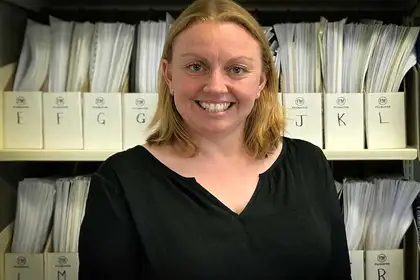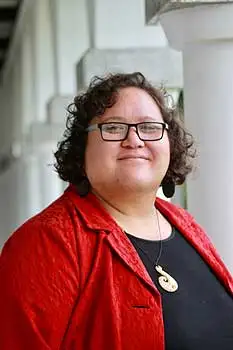
Rutherford Discovery Fellowship recipient Dr Karen Stockin.
Two Massey University academic researchers have been awarded prestigious Rutherford Discovery Fellowships that will allow them to further their research in different fields of science and innovation.
Political philosopher Dr Krushil Watene from the College of Humanities and Social Sciences was awarded a fellowship to develop an approach to intergenerational justice that provides novel and innovative insights for decision-making and policy; while marine ecologist Dr Karen Stockin from the College of Sciences, was awarded a fellowship to explore the development of a new discipline of conservation welfare and how to apply it to incidents when marine mammals become stranded.
The Fellowships, awarded by the Royal Society Te Apārangi, provide early to mid-career researchers with funding of up to $160,000 per year for five years to develop their respective research projects.
Dr Stockin, from Massey’s Institute of Natural and Mathematical Sciences and Animal Welfare Science and Bioethics Centre, will use evolutionary cues and Artificial Intelligence (AI) to assess the conservation welfare gap that occurs during mass whale strandings.
“Despite costly and often logistically challenging attempts to rescue live whales, a lack of scientific evaluation underpins current decision-making processes around this endeavour,” she says.

Rutherford Discovery Fellowship recipIent Dr Krushil Watene.
Dr Stockin plans to instigate the first welfare assessment framework for stranded marine mammals that will be informed via survivorship studies of released whales. She will also examine leader/follower patterns of behaviour to understand which individual whales exhibit the greatest leadership traits.
“The hypothesis is that older, pregnant and or lactating females are likely to demonstrate greatest initial leadership during a rescue attempt, based on evolutionary principles of motivation, knowledge and dominance within the matriarchal pod structure,” she says. Dr Stockin and her team will use the latest computer vision and drone technologies to address this aspect of the study.
Dr Stockin is the current recipient of the Bob Kerridge Animal Welfare Fellowship for investigating the human dynamic to stranding events, as part of her larger project aimed at improving the welfare decisions made for marine mammals during strandings. In addition, Dr Stockin is currently undertaking a fixed term, part-time appointment with the International Whaling Commission to coordinate a new initiative focusing on global cetacean (whales, dolphins and porpoise) strandings. In her role as IWC strandings coordinator, she is working with other international government organisations such as the International Union for Conservation of Nature to improve international response and investigation of stranding events.
She sees this latest accolade as further evidence of the importance of more women becoming involved in science, technology, engineering and mathematics research.
“I’m thrilled to be a woman in STEM and exceptionally proud to be a recipient of the fellowship,” she says.
“There’s an exciting opportunity [with the fellowship] to pioneer conservation-welfare as a newly emerging discipline and how to apply it to the human interactions with wildlife.”
Dr Watene, Ngāti Manu, Te Hikutu, Ngāti Whātua o Orākei Tonga, says that many of our long-held beliefs, such as the notion that the environment is a resource without limit, fail us under the weight of such things as global climate change and rapid technological advancements.
“The impacts of these failures are so far-reaching that people the world over are searching for new and stronger foundations to take us into the future. This research programme looks to the unprecedented philosophical landscapes of Aotearoa New Zealand in order to encounter some innovative solutions.”
She will provide two “pioneering” contributions to philosophy and policy-making, firstly, an account of our obligations to future generations that is grounded in Māori concepts and a decision procedure that models decision-making under conditions inclusive of our obligations to past, present and future generations.
“The result is more than a particular philosophy, but also a way of discussing and debating what is needed in times where people have to engage more robustly in discussions of intergenerational justice. What we ought to leave behind for future generations is one of the most important questions that we face.”
Expressing a feeling of being “incredibly privileged” to have been awarded a fellowship, Dr Watene also felt “an incredible amount of responsibility to contribute positively to the future of Aotearoa New Zealand, and to create a platform that provides other Māori and Pacific scholars (and other women in philosophy) with opportunities to undertake innovative philosophical engagement that positively transforms our communities”.
Dr Watene, the recipient of a Marsden fast-start grant in 2016, will co-host the second engaged philosophy symposium with Dr Kristie Dotson of Michigan State University at the Auckland campus next June. She will host a group of indigenous North American Anishinaabe scholars and elders at her Ngāti Manu marae next July. Dr Watene was also successful in her bid to host the Human Development and Capability Association annual conference at Massey University in 2020.
She describes the environment at the College of Humanities and Social Sciences as “open-minded and innovative”. The college brings together a diverse group of people who are not afraid to engage in open, rich and creative ways. She is especially grateful to the small but supportive group of Massey philosophers, many of whom are at the cutting edge of conceptual conversations globally.